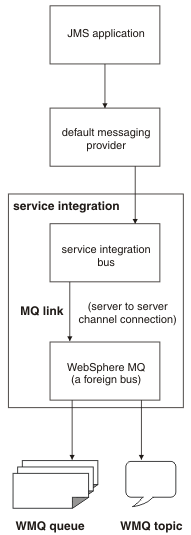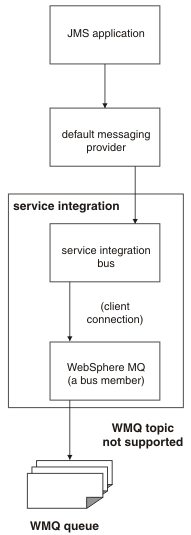Network Deployment (Distributed operating systems), v8.0 > Administer applications and their environment > Administer Messaging resources > Manage messaging with the default messaging provider
Interoperating with a WebSphere MQ network
The default messaging provider (service integration) can interoperate with a WebSphere MQ network by using a WebSphere MQ link or a WebSphere MQ server. Alternatively, you can use WebSphere MQ as your messaging provider. Each type of connectivity is designed for different situations, and provides different advantages. Choose the most appropriate interoperation method for each of your messaging applications.
WAS can interoperate with WebSphere MQ in the following ways:
- By configuring WebSphere MQ as an external JMS provider by using the WebSphere MQ messaging provider.
- By connecting a service integration bus to a WebSphere MQ network by using the default messaging provider and a WebSphere MQ link.
- By integrating
WebSphere MQ
queues into a bus by using the default messaging provider and a
WebSphere MQ server.
A WebSphere MQ link provides a traditional WebSphere MQ -style solution to connecting resources. A WebSphere MQ server adds the ability to directly access WebSphere MQ queues from within a bus.
| WebSphere MQ messaging provider (no bus) | WebSphere MQ network as a foreign bus (using a WebSphere MQ link) | WebSphere MQ queue manager or queue-sharing group as a bus member (using a WebSphere MQ server) |
|---|---|---|
 In this figure, a JMS application uses APIs to send a message to WebSphere MQ, for a topic or queue, via the WebSphere MQ messaging provider. | 
In this figure a JMS application uses the default messaging provider to pass a message to a local service integration bus. The local bus passes the message to a foreign bus, which forwards it across a WebSphere MQ link to a WebSphere MQ queue manager or queue sharing group that acts as the gateway to the WebSphere MQ network. Service integration views the WebSphere MQ network as if it were a foreign bus. |  In this figure, a JMS application uses the default messaging provider to pass a message to a service integration bus. The bus passes the message through a WebSphere MQ server direct to a WebSphere MQ queue. Service integration views the WebSphere MQ server (a WebSphere MQ queue manager or queue-sharing group, and its associated queues) as a member of the local bus. |
| The WebSphere MQ messaging provider does not use service integration. It provides JMS messaging access to WebSphere MQ from WAS. | A WebSphere MQ link provides a server to server channel connection between a service integration bus and a WebSphere MQ queue manager or queue-sharing group, which acts as the gateway to the WebSphere MQ network. When you use a WebSphere MQ link, the messaging bus is seen by the WebSphere MQ network as a virtual queue manager, and the WebSphere MQ network is seen by service integration as a foreign bus. A WebSphere MQ link allows WAS applications to send point-to-point messages to WebSphere MQ queues (defined as destinations in the service integration bus), and allows WebSphere MQ applications to send point-to-point messages to destinations in the service integration bus (defined as remote queues in WebSphere MQ). The link also allows WAS applications to subscribe to messages published by WebSphere MQ applications, and WebSphere MQ applications to subscribe to messages published by WAS applications. The link ensures that messages are converted between the formats used by WAS and those used by WebSphere MQ. | A WebSphere MQ server represents a WebSphere MQ queue manager or (for WebSphere MQ for z/OS ) queue-sharing group. For interoperation with WAS v7.0 or later, the version of WebSphere MQ must be WebSphere MQ for z/OS v6 or later, or WebSphere MQ (distributed platforms) v7 or later. A WebSphere MQ server supports the high availability and optimum load-balancing characteristics provided by a WebSphere MQ for z/OS network. A WebSphere MQ server defines the connection and quality of service properties used for the connection, and also ensures that messages are converted between the formats used by WAS and those used by WebSphere MQ. |
For more information about these approaches, see Interoperation with WebSphere MQ. To interoperate with a WebSphere MQ network complete one or more of the following steps.
Procedure
- Choose the most appropriate interoperation method for each of your messaging applications.
Complete this step if your existing or planned messaging environment involves both
WebSphere MQ and
WAS systems, and it is not clear to you whether you should use the default messaging provider, the WebSphere MQ messaging provider, or a mixture of the two.
- Configure the WebSphere MQ messaging provider.
- Use WebSphere MQ links to connect a bus to a WebSphere MQ network.
- Use WebSphere MQ server to integrate WebSphere MQ queues into a bus.
Connect a bus and a WebSphere MQ gateway queue manager to use point-to-point messaging